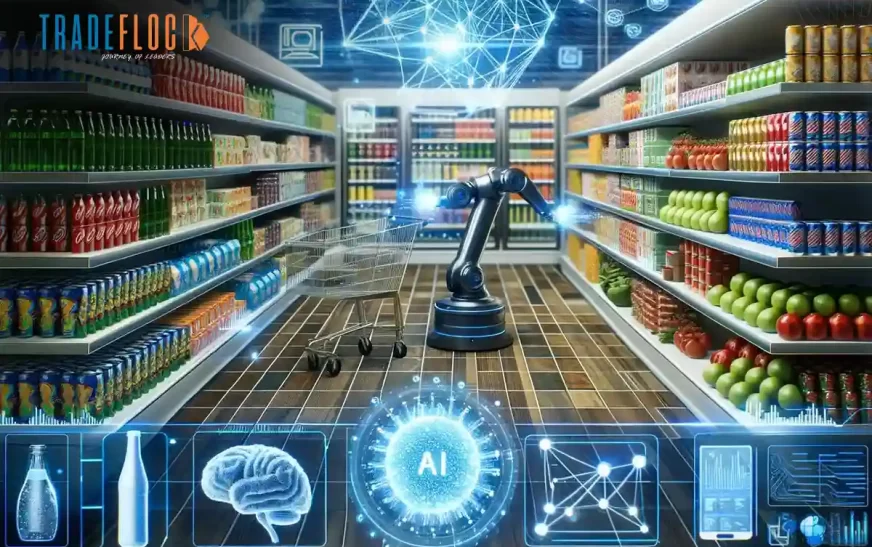Healthcare, Financing, Manufacturing, Automotive, Education, Entertainment & Media, Agriculture, Real Estate, Travel & Hospitality, and even Cybersecurity — AI, Artificial Intelligence, is everywhere.
Think the consumer goods industry has fallen behind? Not at all! AI has also revolutionised the CG sector, introducing groundbreaking trends that are reshaping product development, personalisation, supply chain efficiency, and customer engagement on a massive scale.
From smart inventions to product recommendations, the consumer product industry is leveraging AI trends to meet evolving consumer demand. These innovations not only streamline operations but also boost customer experience, giving the brand a competitive edge in the fast-paced market.
Ready to explore artificial intelligence trends transforming the consumer goods industry? Let’s dive in.
Emerging AI Trends Transforming Consumer Product Experience
AI has the power to accelerate economic value, increase productivity, and reduce the burden. According to the Work, Workforce, Workers reports, Gen AI can significantly change the work as it can automate tasks. Here are a few AI trends that are shaping the consumer goods industry.
1. Hyper-personalised Shopping Experiences
Analysing a customer’s browsing behaviour, purchase history, preferences, and even mood is one of the AI trends that delivers a deeply personalised shopping experience.
For instance, an AI tool can help you find outfits based on celebrity style, offering both exact matches and budget-friendly alternatives.
This trend allows brands to connect with customers in a more meaningful way and increase conversational rate through relevance and timing.
2. AI-Driven Supply Chain Optimisation
Efficient inventory management, predictive analytics and real-time demand forecasting are critical in the Fast-Moving Consumer Goods (FMCG) space. AI tools are making these processes more accurate and responsive by automating the process. Optimising the supply chain with advanced tools is one of the AI trends that enables brands to enhance their product supply.
For instance, eCommerce websites use AI to forecast demand, optimise warehouse operations, and automatically restock high-demand items.
By optimising every step from production to delivery, AI helps reduce cost, speed up the process and ultimately enhance customer satisfaction through fast fulfilment.
3. Smart Appliances And Connected Customer Products
In the consumer goods industry, AI has become a part of nearly every area — from manufacturing to packaging and supplying goods. Turning every household appliance into intelligent assistance is one of the AI trends that makes life easier, more efficient and sometimes more fun.
For instance, AI-powered refrigerators track expiration dates, suggest recipes and alert users to restock items.
These products learn from user habits, adapt over time and reduce the need for manual input, making homes smarter and more responsive.
4. Enhanced Customer Engagement With AI Chatbots
As today, customers seek instant, round-the-clock customer care services, AI-powered virtual assistance and chatbots help brands meet this demand by delivering personalised support at scale. Using chatbots for customer care services is among the most effective AI trends, as they not only provide instant support but also serve the maximum number of customers simultaneously.
For instance, H&M’s AI chatbot assists customers in selecting outfits based on their preferences, thereby enhancing customer satisfaction and reducing returns
AI reduces the human workload and ensures consistent, accurate responses, thereby improving both efficiency and the user experience.
5. AI-Backed Sustainability and Ethical Sourcing
Sustainability is a growing concern and has become a priority. Tracking environmental impact is one of the AI trends that, in turn, reduces energy usage and improves ethical sourcing.
For instance, AI-backed companies in the consumer goods industry help brands reduce carbon emissions during the delivery of their products.
By embracing this artificial intelligence trend, the consumer goods industry can effectively appeal to customers to adopt sustainable practices.
What’s Next?
In simple words, AI is everything and is everywhere, and it is going anywhere anytime soon. As AI tools become more advanced and accessible, expect even deeper integration into everyday consumer products. The future will likely bring voice-activated shopping, emotion-aware personalisation, and AI-curated lifestyle bundles. That means AI will be an integral part of our lives, regardless of how last year was.











